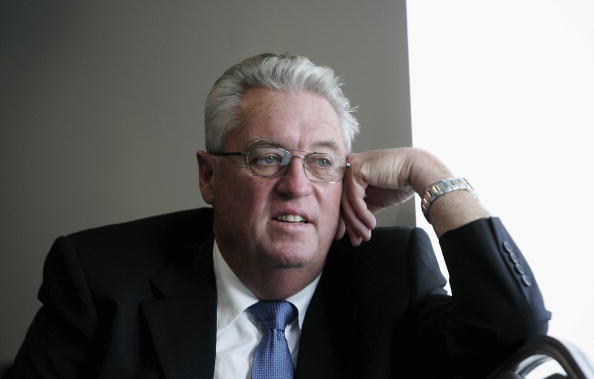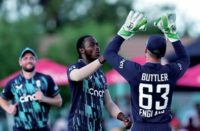Alison Mitchell recalls the unfolding of events in Jamaica in the bizarre aftermath of Bob Woolmer’s death
Reporting on the death of Bob Woolmer remains the most challenging and emotionally testing experience of my career.
I was sitting in the lobby of the Sunset Jamaica Grande in Ocho Rios when I first heard the news that Woolmer had been found unconscious in the Pegasus Hotel in Kingston. I had followed the Ireland team across the Blue Mountains after their momentous World Cup victory over Pakistan and had taken my microphone to record the sounds of their raucous St Patrick’s Day party in the resort where the Irish family and friends were staying.
After only getting to bed at 5am, I woke to reports that effigies of Bob Woolmer and captain Inzamam-ul-Haq were being burnt in the streets of Pakistan. It was not an uncommon occurrence after a Pakistan defeat, but this loss was one of the most significant and unexpected, and the reaction was accordingly severe.
I was sitting next to ICC media manager James Fitzgerald, waiting to go live on Test Match Special to describe the merriment of the Irish party, when James’ phone suddenly rang. A few minutes later I wasn’t on TMS talking about jubilant Irish players being thrown into swimming pools – I was desperately trying to get a signal on my local mobile phone so that I could reach the on-air studio at BBC Radio 5 live.
Eventually I got through and gave what little information I had on air; Woolmer had been found unconscious in his hotel room and taken to hospital. That was all I knew. I broke the news, but it was about to get so much worse.
James needed to get back to Kingston immediately and so did I, so he drove us both back over the Blue Mountains, a journey that lasted 2-3 hours. Before we reached the city, we heard that Woolmer had died. I remember a heavy, sick feeling in the pit of my stomach.
On arrival at the Pegasus Hotel, the Pakistan media manager, PJ Mir, had already been holding court to reporters, describing in some graphic detail what he had seen when he went into Woolmer’s room. Three of my BBC Radio colleagues had just flown back into Kingston ready to commentate the next day’s World Cup match between West Indies and Zimbabwe and instead of a leisurely afternoon preparing, they were thrust into chaotic scenes at the Pegasus.
That evening, a media scrum ensued in the hotel lobby as the Jamaica Prime Minster arrived to offer condolences to the players. Then, less than 12 hours after his coach had died, Inzamam-ul-Haq called a sudden Press conference and announced his ODI retirement. To this day, it remains the strangest timing of a retirement announcement I have known. It felt inappropriate.
At that stage we had no inkling as to what would unfold the next evening. The police called a Press conference very hastily and late at night at the Pegasus where they announced they were treating Woolmer’s death as suspicious. It was a bombshell. I remember getting very little sleep as I talked continuously to BBC networks across radio and television until 4am, then put my head down knowing I had to get up three hours later to cover Pakistan v Zimbabwe. But the cricket suddenly felt like a side-show.
Local news journalists were now joined by international news hounds, many from networks and newspapers in America, who had no idea what cricket was, or who Bob Woolmer was, but had sensed a big story. Rumours started about the cause of death and next morning the Jamaica Gleaner ran a story claiming Woolmer had been strangled. It was against this backdrop Inzamam played his last ODI. I can’t even recall the result but I remember Inzy walking off the field after his dismissal, his shoulders suddenly heaving, and him breaking down in tears.
The next morning, I was back at the Pegasus and I stumbled into a meeting room strewn with screwed up pieces of tissue smudged with ink. The Pakistan players had just been finger-printed. The atmosphere in the hotel was strange and tense. No one knew if they were under suspicion, but at the same time it was as if everybody was. Stories were run about match-fixers; that Woolmer was about to blow the lid on corruption in the team; that he might have been poisoned; or that he could even have killed himself.
After giving interviews to the police, Pakistan were given permission to leave Kingston and they took refuge in a resort in Montego Bay, a 40-minute flight away. Later that evening the vastly expanded media circus packed into a Press conference in the Pegasus to hear police state Woolmer died of “asphyxiation as a result of manual strangulation”. Chilling words I will never forget. His death was now a case of murder.
I flew to Montego Bay the next night to be with the Pakistan team, as they still weren’t allowed to leave. I was involved in a flurry of media activity when it was discovered three of the team were being questioned again by police shortly before they were due to head to the airport. The squad was eventually able to fly out of Kingston, except for fitness trainer, Murray Stevenson, who had become the Woolmer family’s liaison.
He has told me in recent days how he worried about his own safety. Stevenson had been close to Bob and such was the craziness of the time that he wondered whether he could be next on a hit-list.
We’d been told Woolmer had been murdered, so there was, by definition, a killer on the loose. I only stopped to think about the apparent proximity of a murderer when the intensity of my immediate reporting was over and I, too, was able to fly home, leaving BBC News crews to cover the murder investigation. I finally had a good cry – partly through grief, and partly through relief. It had been an emotionally intense and highly charged week for all concerned.
It was June when I heard that the police were closing their investigation. They now believed Woolmer died of natural causes, most likely a heart attack. At the subsequent inquest, however, the jury could only return an open verdict, inevitably leaving room for questions.
The Woolmer family, though, are content with information the police have shared with them about the lack of credible evidence for murder. Ten years on, they have no further questions to ask.
This piece originally featured in The Cricket Paper, March 17 2017
Subscribe to the digital edition of The Cricket Paper here















